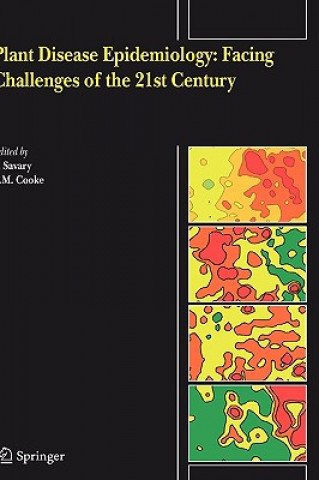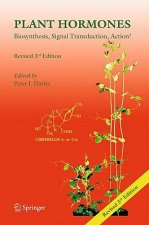
Kod: 01416815
Plant Disease Epidemiology: Facing Challenges of the 21st Century
Autor S. Savary, B.M. Cooke
Plant disease epidemiology deals with diseases in plant populations. During the past century, it has become a vibrant field of science, achieving significant conceptual innovations with an important impact on the management of pla ... więcej
- Język:
 Angielski
Angielski - Oprawa: Twarda
- Liczba stron: 138
Wydawca: Springer-Verlag New York Inc., 2006
- Więcej informacji o książce

121.19 €

Dostępna u dostawcy w małych ilościach
Wysyłamy za 10 - 14 dni
Potrzebujesz więcej egzemplarzy?Jeżeli jesteś zainteresowany zakupem większej ilości egzemplarzy, skontaktuj się z nami, aby sprawdzić ich dostępność.
Dodaj do schowka
Zobacz książki o podobnej tematyce
-

Berliner Platz 3 Intensivtrainer
7.46 € -4 % -

Level 5: Rebecca Book and MP3 Pack
10.89 € -5 % -

Darkness Devours
11.60 € -4 % -

Categorical Data Analysis, 3e
180.13 € -

Skripta Y
10.28 € -5 % -

Einseitige Interpretationserklärungen zu multilateralen Verträgen.
73.66 € -

Cooperative Design, Visualization, and Engineering
61.45 €
Bon podarunkowy: Radość gwarantowana
- Podaruj bon o dowolnej wartości, a my się zajmiemy resztą.
- Bon podarunkowy dotyczy całej naszej oferty.
- Możesz wydrukować elektroniczny bon z e-maila a następnie przekazać go obdarowanemu.
- Ważność bonu wynosi 12 miesięcy od daty wystawienia.
Więcej informacji o Plant Disease Epidemiology: Facing Challenges of the 21st Century
Za ten zakup dostaniesz 304 punkty
 Opis
Opis
Plant disease epidemiology deals with diseases in plant populations. During the past century, it has become a vibrant field of science, achieving significant conceptual innovations with an important impact on the management of plant diseases. Plant disease epidemiology mobilises concepts and methods from ecology, genetics, environmental physics, botany, and mathematics. It deals with cultivated and non-cultivated plants in environments where human activities may have had an impact. Now, plant disease epidemiology faces important questions. Global climate is changing at a rapid rate: will it render plant diseases more, or less, harmful to man-made ecosystems? There is much debate on this issue, partly because climate has sometimes very large effects on the local environment of growing plant canopies, and because the physical micro-environment so strongly influences plant diseases and their consequences on ecosystem functioning and performance and the way they are managed. Plant disease epidemiologists have a strong scientific tradition in studying climate-pathogen-disease relationships. Biodiversity is also of global concern. The decline of global biodiversity that is currently taking place has been referred to as the sixth great extinction process our planet has experienced during its history, but this time, it is man-made. Generations of plant pathologists, and especially, of plant disease epidemiologists, have been dealing with biodiversity. It is from this diversity that presumably the most potent instrument for disease management has been developed by plant pathologists: host plant resistance. Host plant diversity, and the disease resistance genes it harbours, can be deployed over time and space, according to epidemiological principles. Sustainable production and protection systems also need to be devised which could exploit scarcer resources sparingly, and if possible enhance the resource base. Plant disease epidemiologists alone cannot provide answers to such questions, but certainly could significantly contribute to these new strategies. This book provides an overview of some of the latest research in plant disease epidemiology from researchers at the cutting edge of this important discipline.As the global climate changes, plant disease epidemiology faces important questions: Will climate change render plant diseases more harmful to man-made ecosystems, or less? Can sustainable systems be developed in time to spare and enhance shrinking resources? How will changes in host plant diversity affect genetic disease resistance? This book provides an overview of current research in plant disease epidemiology from researchers at the cutting edge of this important discipline.Plant disease epidemiology deals with diseases in plant populations. During the past century, it has become a vibrant field of science, achieving significant conceptual innovations with an important impact on the management of plant diseases. Plant disease epidemiology mobilises concepts and methods from ecology, genetics, environmental physics, botany, and mathematics. It deals with cultivated and non-cultivated plants in environments where human activities may have had an impact. Now, plant disease epidemiology faces important questions. Global climate is changing at a rapid rate: will it render plant diseases more, or less, harmful to man-made ecosystems? There is much debate on this issue, partly because climate has sometimes very large effects on the local environment of growing plant canopies, and because the physical micro-environment so strongly influences plant diseases and their consequences on ecosystem functioning and performance and the way they are managed. Plant disease epidemiologists have a strong scientific tradition in studying climate-pathogen-disease relationships. Biodiversity is also of global concern. The decline of global biodiversity that is currently taking place has been referred to as the sixth great extinction process our planet has experienced during its history, but this time, it is man-made. Generations of plant pathologists, and especially, of plant disease epidemiologists, have been dealing with biodiversity. It is from this diversity that presumably the most potent instrument for disease management has been developed by plant pathologists: host plant resistance. Host plant diversity, and the disease resistance genes it harbours, can be deployed over time and space, according to epidemiological principles. Sustainable production and protection systems also need to be devised which could exploit scarcer resources sparingly, and if possible enhance the resource base. Plant disease epidemiologists alone cannot provide answers to such questions, but certainly could significantly contribute to these new strategies. This book provides an overview of some of the latest research in plant disease epidemiology from researchers at the cutting edge of this important discipline. §Reprinted from European Journal of Plant Pathology, Volume 115, No. 1, 2006
 Szczegóły książki
Szczegóły książki
Kategoria Książki po angielsku Mathematics & science Biology, life sciences Botany & plant sciences
121.19 €
- Pełny tytuł: Plant Disease Epidemiology: Facing Challenges of the 21st Century
- Podtytuł: Under the aegis of an International Plant Disease Epidemiology Workshop held at Landernau, France, 10-15th April, 2005
- Autor: S. Savary, B.M. Cooke
- Język:
 Angielski
Angielski - Oprawa: Twarda
- Liczba stron: 138
- EAN: 9781402050190
- ISBN: 1402050194
- ID: 01416815
- Wydawca: Springer-Verlag New York Inc.
- Waga: 860 g
- Wymiary: 235 × 155 × 13 mm
- Data wydania: 18. July 2006
Ulubione w innej kategorii
-

Plants from Test Tubes : An Introduction to Micropropagation
26.03 € -36 % -

Finding the Mother Tree
12.91 € -22 % -

Maria Sibylla Merian
19.87 € -20 % -

Succulent Flora of Southern Africa
23.20 € -17 % -

Neem
266.92 € -

Flora of North America
110.90 € -

Teaming with Nutrients
20.98 € -18 % -

Plant Pathology
90.01 € -1 % -

Plant Systematics
100.30 € -1 % -

Native American Ethnobotany
61.45 € -23 % -

Physicochemical and Environmental Plant Physiology
142.18 € -

Plant Pathology and Plant Diseases
64.17 € -13 % -

Plant Ecology
90.61 € -4 % -

Raven Biology of Plants
98.38 € -

Orchids of Tropical America
23.30 € -24 % -

Rare and Exotic Orchids
50.75 € -9 % -

Tree Ferns
19.97 € -13 % -

Applied Tree Biology
93.44 € -

Hartmann & Kester's Plant Propagation: Principles and Practices
88.19 € -

The Citron Compendium
61.25 € -2 % -

Introduction to Plant Structure and Development
91.32 € -

Cacti
90.82 € -

Illustrated Encyclopedia of Clematis
36.12 € -13 % -

Conservation Methods for Terrestrial Orchids
77.70 € -

Arctic Plants of Svalbard
40.76 € -19 % -

Bogs & Fens - A Guide to the Peatland Plants of the Northeastern United States and Adjacent Canada
20.88 € -19 % -

Plants and Microclimate
73.36 € -

In Praise of Plants
22.60 € -12 % -

From Plant Traits to Vegetation Structure
77.60 € -

RSPB Nature Tracker's Handbook
17.35 € -18 % -

Alexander von Humboldt
77.19 € -

Plant Hormones
314.25 € -3 % -

RHS Genealogy for Gardeners
20.27 € -28 % -

Comfortably Unaware
13.51 € -16 % -

Darwin's Most Wonderful Plants
10.59 € -18 % -

Metamorphosis of Plants
28.75 € -18 % -

Plant Behaviour and Intelligence
82.04 € -

Brilliant Green
14.52 € -39 % -

Animal, Vegetable, Miracle
13.01 € -24 % -

Big, Bad Book of Botany
13.31 € -28 % -

Flowers of Greece and the Balkans
104.64 € -

Plants: A Very Short Introduction
9.27 € -28 % -

Agrochemicals in Soil and Environment
218.98 € -

Tropical Fruits and Other Edible Plants of the World
49.14 € -

Flora of Madeira
140.16 € -

Plant Biology
93.14 € -

What a Plant Knows
17.85 € -6 % -

Atlas of Poetic Botany
22.60 € -13 % -

Moss Flora of Britain and Ireland
186.38 €
Osobní odběr Bratislava a 2642 dalších
Copyright ©2008-24 najlacnejsie-knihy.sk Wszelkie prawa zastrzeżonePrywatnieCookies


 Vrácení do měsíce
Vrácení do měsíce Zdarma od 49.99 €
Zdarma od 49.99 € 02/210 210 99 (8-15.30h)
02/210 210 99 (8-15.30h)